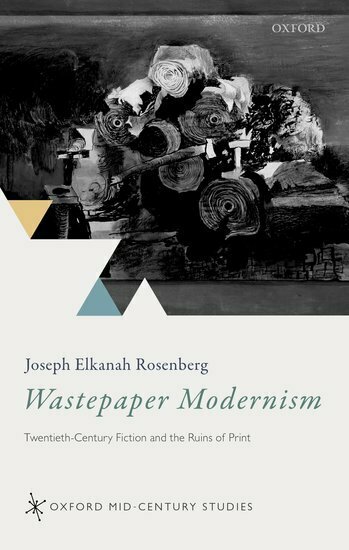
PLS Professor Joseph Elkanah Rosenberg recently published his first book, Wastepaper Modernism: Twentieth-Century Fiction and the Ruins of Print. To mark the occasion, he spoke with us about the process of writing this book and what he's working on now.
What is your book about?
Wastepaper Modernism is about how a number of modernist writers — including Henry James, James Joyce, Elizabeth Bowen, and Vladimir Nabokov — imagined the destruction of paper. We tend to think of ‘the death of paper’ as being a very contemporary phenomenon, something that comes about with the internet, the Kindle, and other “virtual” technologies. Wastepaper Modernism shows that this anxiety is, in fact, pretty old, stretching back at least as far to the invention of the radio and the cinema. The writers I look at were acutely interested in, but also made quite anxious by, the rise of these older “new media.” But they put this anxiety to use. I argue that by imagining the destruction of of literature’s physical materials, these writers were really reckoning with the limits of literature itself as a medium. The phenomenon that I call “wastepaper modernism” arises when fiction imagines its own processes of transmission and representation breaking down. When the descriptive capabilities of the novel exhaust themselves, the wastepaper modernists picture instead the physical decay of the book's own primary matter.
What inspired it?
Even though it only comes up briefly in Wastepaper Modernism, the project was inspired by a line in T.S. Eliot’s The Waste Land. The poet, surveying the river Thames, laments that that that the river “bears no empty bottles, sandwich papers, silk handkerchiefs, cardboard boxes, cigarette ends or other testimony of summer nights.” I was really struck by why Eliot, in a poem seemingly about waste and wasting, would long for the river to be filled with trash. So, I started compiling a scrapbook of waste in modernist literature. After some scrupulous sifting, I noticed wastepaper appearing over and over again. And lo and behold, out of such scraps a project was born.
What did you learn in the process of researching and writing it, about the subject matter and/or yourself, that you found surprising, unsettling, and/or affirming?
Someone once told me that all scholarly projects are autobiographical, or at least to some degree. I hesitate to say what Wastepaper Modernism reveals about my personality, but I learned a great deal about why I work on the literature that I do. Specifically, I learned that I’m most interested in the ways that certain kinds of literature push against conventional modes of meaning and knowledge. What appeals to me about modernist literature is less its spirit of triumphant newness so much as the way it breaks traditional literary forms — sometimes with ugliness, but often with great beauty. I find this to to be surprising and unsettling, but also strangely affirming.
How did writing this book inform your teaching and your intellectual life as a member of the PLS community and vice versa?
I can't help myself from hearing echoes of wastepaper modernism in every seminar and tutorial, and often in (at least to me) surprising places. I had a brief crisis the first time I taught Seminar V when I realized that almost everything I talk about in the book could be applied to Moby Dick. But the same could also be said of Hamlet, or Don Quixote. Teaching the long history of literature and philosophy certainly humbles one’s scholarly certitudes!
What are you working on now?
I am currently working on a new project about “late modernism" and failure. Modernism was a revolutionary literary movement, one that rebelled against staid artistic practices, repressive societal conventions, and oppressive political systems. What is seldom acknowledged, however, is that most of these revolutions either failed or were left incomplete: the middlebrow triumphed over the avant-garde, new methods of representation quickly became old habits, and the world revolution never arrived. I’m interested in how later modernist writers such as Samuel Beckett and Henry Green rebelled against their rebellious precursors by employing failure itself as a kind of aesthetic strategy. Right now, I’m thinking a lot about literary works that either deliberately miss elements or self-consciously implode into various kinds of “bad” writing: bathos, triviality, vacuity, and cliché.